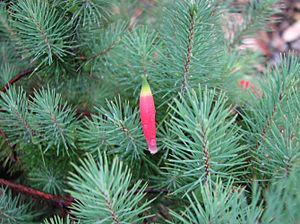Astroloma pinifolium facts for kids
Quick facts for kids Astroloma pinifolium |
|
|---|---|
 |
|
| Scientific classification |
|
| Kingdom: | Plantae |
| Clade: | Tracheophytes |
| Clade: | Angiosperms |
| Clade: | Eudicots |
| Clade: | Asterids |
| Order: | Ericales |
| Family: | Ericaceae |
| Genus: | Astroloma |
| Species: |
A. pinifolium
|
| Binomial name | |
| Astroloma pinifolium (R. Br.) Benth.
|
|
| Script error: The function "autoWithCaption" does not exist. | |
Script error: No such module "Check for conflicting parameters".
The Astroloma pinifolium, also known as pine heath, is a small plant that grows close to the ground. It belongs to the Ericaceae family, which includes many types of heaths. This plant is native to eastern Australia.
Contents
What is Pine Heath?
Pine heath is a low-growing shrub or groundcover plant. It gets its common name, "pine heath," because its leaves look a bit like pine needles. It's a special plant found only in certain parts of Australia.
How it Got its Name
The scientific name for this plant is Astroloma pinifolium. The name pinifolium comes from two Latin words: pinus, meaning "pine," and folium, meaning "leaf." So, its name literally means "pine leaf," which makes sense because of its needle-like leaves!
A botanist named Robert Brown first described this plant in 1810. Later, in 1868, another botanist, George Bentham, placed it into the Astroloma group of plants.
What it Looks Like
Pine heath is a spreading shrub that usually grows between 30 cm (about 1 foot) and 1 meter (about 3 feet) tall. It can spread out quite a bit, from 0.5 to 1.5 meters (about 1.5 to 5 feet) wide.
- Leaves: Its stems are covered with lots of small, hairy leaves that look like tiny pine needles. These leaves are about 1 to 3 cm (0.4 to 1.2 inches) long.
- Flowers: The plant produces tubular flowers, which are shaped like small tubes. They can be up to 2 cm (0.8 inches) long. You can usually see these flowers from August to April. They grow one by one along the stems and can be yellow or pink, often with a yellow band and a green tip.
- Berries: After the flowers, small, pale green, round berries appear. These berries are about 0.5 cm (0.2 inches) across.
Where it Grows
Pine heath is found along the coast of New South Wales in Australia, stretching south into Victoria and Tasmania. It also grows in the Southern Tablelands and along the Great Dividing Range.
This plant prefers to grow in open forests and heathlands. It likes sandy soils that drain water well.
Animals and Pine Heath
The berries of the pine heath are a favorite food for a bird called the grey currawong. In Tasmania, this bird is sometimes called the clinking currawong or black jay.
Growing Pine Heath
If you wanted to grow pine heath, it does best in soil that drains well. You can plant it in containers or in a garden where it gets some shade. New plants can be grown from cuttings taken from an existing plant.
See Also
- List of Astroloma species
Images for kids
 | Sharif Bey |
 | Hale Woodruff |
 | Richmond Barthé |
 | Purvis Young |


